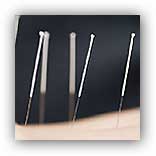|
Patients treated for head and neck cancer may
develop unpleasant sequelae such as
radiation-induced dry mouth (xerostomia), a common
side-effect following radical or adjuvant
radiotherapy. Although parotid function may recover
within 18 months of treatment, prevalence of
persistent xerostomia can be as high as 41% 5 years
after radiotherapy.

Chronic xerostomia impairs quality of life;
interfering with taste, chewing, swallowing,
speaking, and sleeping. Management options providing
short-term help include mouthwashes, gels and
toothpastes. Pilocarpine taken regularly can offer
relief; however, muscarinic receptors stimulation
may cause sweating, rhinitis, and urinary frequency.
Acupuncture is an increasingly accepted means for
controlling pain, chemotherapy-induced nausea, and
hot flushes. Studies suggest that it may also be
beneficial in relieving symptoms of xerostomia. In a
recent phase II study of acupuncture-like
transcutaneous electrical nerve stimulation, 47
patients with xerostomia received 24 sessions over
12 weeks.
Positive treatment responses were achieved in 30
(86%) patients at 6 months.
Another study randomised patients with
nasopharyngeal cancer to acupuncture and standard
care during radiotherapy treatment to determine
whether acupuncture helped prevent xerostomia. The
results showed significant differences favouring
acupuncture in PROs and salivary flow rate.
Seven oncology centres in England, UK, participated
in the Acupuncture in the treatment of
Radiation-Induced Xerostomia (ARIX) trial. Patients
treated with radical radiotherapy (at least one
parotid gland in the irradiated field) and
recurrence free ≥18 months later were eligible.
This study is the largest reported randomised trial
of acupuncture for the amelioration of radiation
induced xerostomia in patients treated for head and
neck cancer.
Results show that a course of group acupuncture was
useful in relieving symptoms of dry mouth, and
provided greater benefit than oral care alone.
Eight sessions of weekly group acupuncture compared
with group oral care education provide significantly
better relief of symptoms in patients suffering from
chronic radiation-induced xerostomia.
There were significant reductions in patients'
reporting of severe dry mouth, sticky saliva,
needing to sip to swallow food, and in waking up at
night to drink.
There was very little variability in overall quality
of life in these patients, who functioned well over
the length of the trial.
Researchers did not demonstrate a link between
subjective improvements in dry mouth and rates of
saliva.
The basal and stimulated salivary flow rates vary
significantly between individuals and subjective
sensations of oral dryness are not reliable
indicators of measurable flow rate.
For more informations:
Annals of Oncology
ARIX: A randomised trial of acupuncture v oral care
sessions in patients with chronic xerostomia
following treatment of head and neck cancer
Link...
MDN |